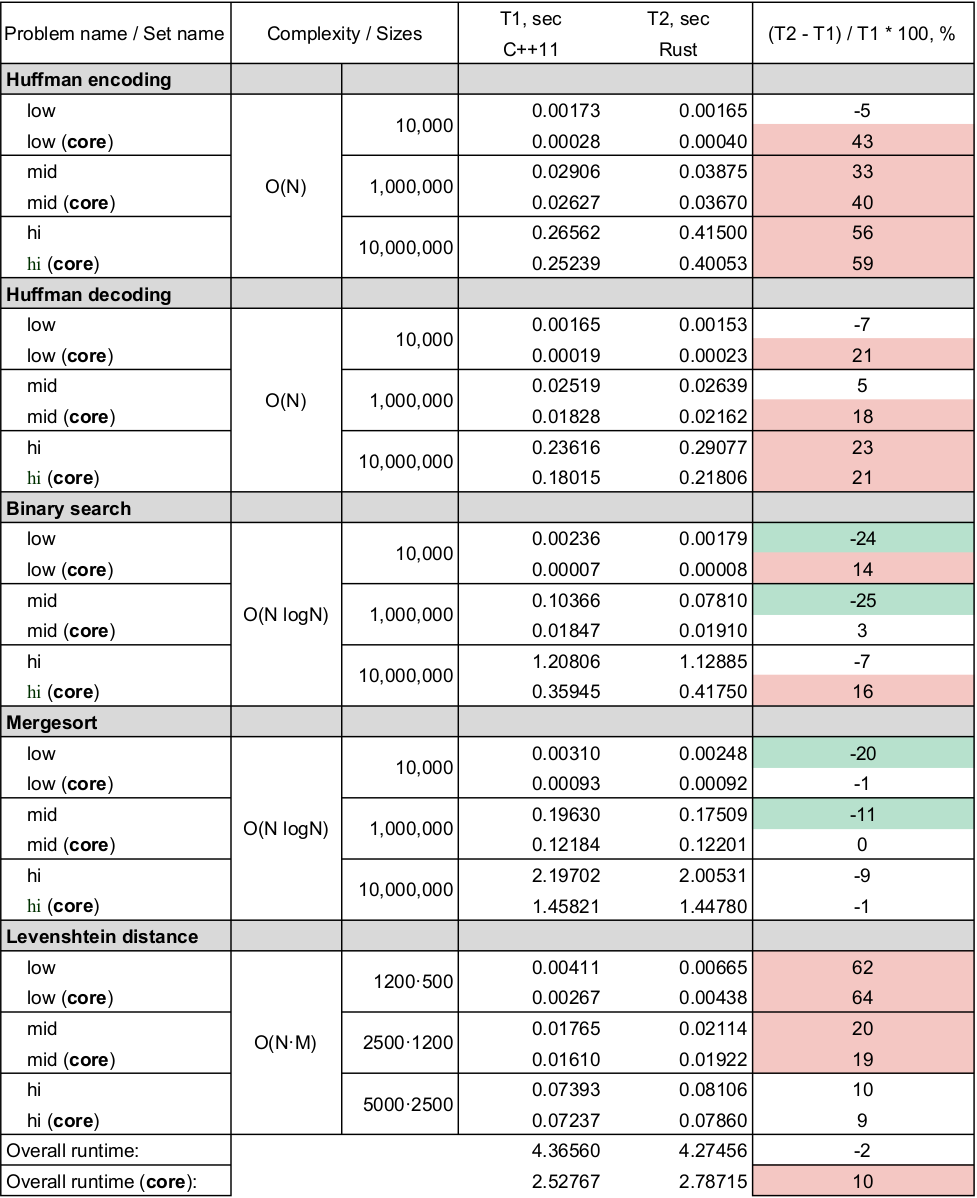The goal of this project is to understand programming idioms of Rust, and roughly measure Rust performance compared to C++11. For this purpose several well known algorithmic problems were considered. The problems were inspired and evolved from great computer science course "Algorithms: Theory & Practice" on Stepik paltform. Here the link to the course: https://stepik.org/course/217/syllabus .
Here is short overview of the programming problems considered in the project. More detailed description of each task could be found in the tasks' folders.
huffman_encoding and huffman_decoding are about of building optimal prefix
code for the given message and decoding it back. These problems are about to
work with priority queque (heap data structure), binary tree and hash map.
Particular realisations on Rust and C++11 relies on standard libraries'
realisation of hash map and priority queue implementing only binary tree to
solve the problem. Complexity is O(N) for building the code.
binary_search is quite well known and straightforward algorithm for searching
of the particular value in a sorted array. Here is no significant distinctions
in realisations. Complexity is O(logN).
mergesort algorithm of sorting is implemented in non-recursion way in order
to avoid stack overflow. Complexity is O(N logN).
levenshtein distance is usually used to quantify the difference between two
strings. The algorithm is implemented in dynamic prgramming manner. Complexity is O(N^2).
(core) means measurments of only algorithmic part of the programs (excluding
startup, input-output operations)
Each problem can be found in the folder with the same name. In each folder here
are main.cpp and main.rs source codes which is solving the described
problems in C++11 and Rust. Also here is Makefile in each folder to compile
the programs, prepare test data and perform performance measures. The common
part of the Makefile can be found in common/common.make.
Also each problem's folder contains generator project on Rust which is
dedicated to generate input data for prgrams for testing purposes.
Although one can find brief overview of the problems above, in the particular
folder here is README.md with more formal problem descriptions and notes.
Each problem has Make scenario with 4 rules: main_rust, main_cpp, gen and
bench. First two are about compiling the programs. Every program recieves its
input on stdin and write results in stdout. gen will prepare test data:
three input sets inp_low, inp_mid, inp_hi with increasing problem sizes.
Generally, inp_low contains smallest inputs, and inp_hi contains millions
of entities and it usually takes few seconds to solve the problem of a such size.
bench rule will call common/compare_performace.sh which will perform N (N =
10) runs of every input on evety program and everage the result. Occasianally,
here is not standard command line tool for measure the program runtime in
milisecond resolution for Mac Os X and Linux.. Therefore in common/measure
you will find a small rust program to meausre the runtime of another program.
To run all steps in once, one can use run_bench.sh. It will take up to ten
minutes to perform all compilations, generations and performance measures.
The next command line is used to compile C++ program:
g++ -std=c++11 -O2 -DNDEBUG -o main_cpp main.cpp
The next command line is used to compile Rust program:
rustc -O --crate-name main_rust main.rs
One needs to run Mac Os X or Linux with installed to PATH GNU C++ compiler or Clang and Rust. By the author the presented project was tested with the next softwares:
> rustc --version -v 9:06:07 ☁ edit1 ☂ 𝝙 ✭ 𝝙 khdmitry-pc
rustc 1.22.1 (05e2e1c41 2017-11-22)
binary: rustc
commit-hash: 05e2e1c41414e8fc73d0f267ea8dab1a3eeeaa99
commit-date: 2017-11-22
host: x86_64-unknown-linux-gnu
release: 1.22.1
LLVM version: 4.0
> g++ -v
...
gcc version 7.2.0
Actually here is no any type of restrictions on the materials in this repository. Anyone can do anything with the source code and results.
